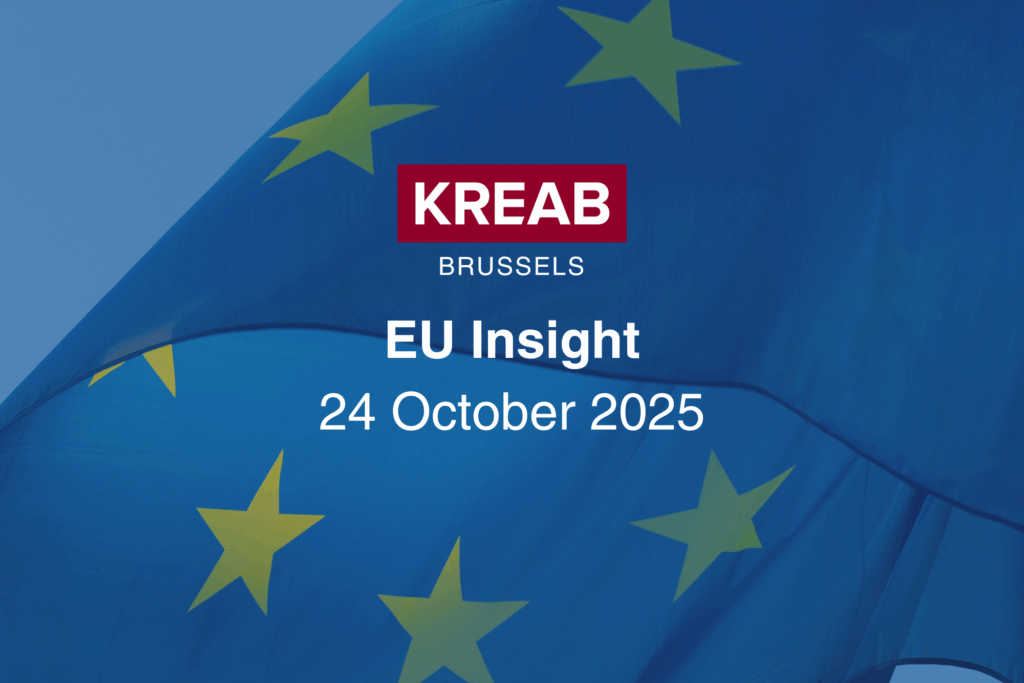
24/10/2025
EU Insight 24 October 2025
Brussels, 24 October 2025
EUCO SUMMIT CALLS FOR DEFENCE AND COMPETITIVENESS EFFORTS
On Thursday, EU Heads of State and Government met in Brussels for a EUCO summit focusing on Ukraine, defence, competitiveness, climate transition and housing. Most notably, leaders adopted the 19th sanctions package against Russia, while also committing to continue supporting Ukraine, which could take the form of a Russian frozen assets-backed loan. However, Belgian Prime-Minister Bart de Wever questioned the legality of moving those funds, effectively blocking the decision for the moment. Talks also focused on the 2040 climate target, with calls to increase investments in clean tech in Europe, linking sustainability discussions further with competitiveness. In addition, leaders met during the Euro summit to discuss the resilience of the euro currency, potential opportunities for the euro to take a more international role, and how to strengthen Europe’s strategic sovereignty and economic security through the digital euro project.
EU ADOPTS 19th SANCTIONS PACKAGE AGAINST RUSSIA
Member States have formally agreed on the EU’s 19th sanctions package against Russia, having finally overcome opposition from Slovakia and Hungary after securing assurances on aid for energy costs. The latest package presents strong actions against the Russian energy sector, notably banning imports of Russian liquefied natural gas from 1 January 2027, and earlier for short-term contracts. The package also expands financial restrictions, including on Russian banks and payment systems, and for the first time targeting crypto-currency transactions. In addition, Member States have decided to further target advanced technologies and trade in strategic materials through export restrictions and bans.
COMMISSION SETS SIMPLIFICATION AS MAIN PRIORITY FOR 2026
The Commission unveiled its work programme titled ‘Europe’s Independence Moment’, presenting the Commission’s upcoming initiatives for 2026. During the presentation, Commission President von der Leyen emphasised the need to move forward with the Draghi agenda, and put simplification at the forefront of the EU’s agenda. Noteworthy upcoming initiatives include further omnibuses such as on energy, taxation, defence, as well as measures to boost the EU’s competitiveness through a 28th Regime for innovative companies, Quantum Act, and Cloud and AI Development Act. The programme also lists initiatives to be withdrawn, including several tax files and the forest monitoring framework. In parallel, the Commission released its first ever annual overview on simplification, implementation and enforcement, which takes stock of the simplification work conducted in the past months.
PARLIAMENT AND COUNCIL ARE READY TO NEGOTIATE ON RUSSIAN ENERGY IMPORTS BAN
Following last week’s adoption of the draft law banning imports of Russian oil and natural gas in the ITRE and INTA committees, this week MEPs voted in favour of entering into negotiations with the Council. In parallel, EU ministers also adopted their joint position on the file. The Council’s position mirrors the Commission’s proposal to ban Russian gas imports from 1 January 2026, with transitional arrangements for existing contracts. Main changes include lighter documentation requirements and procedures for imports of non-Russian gas, clarifications on the suspension clause, and a request that the Commission reviews the implementation of the regulation within two years of its entry into force. The Parliament and Council will now begin discussions with a view to reaching an agreement rapidly.
COMMISSION PROPOSES TARGETED DELAY AND SIMPLIFIED RULES ON DEFORESTATION
The Commission has presented a proposal for selective postponement and streamlined requirements under the EU Deforestation Regulation. Compliance for micro- and small enterprises would be deferred until 30 December 2026, while large and medium-sized companies remain subject to the end-2025 deadline, with a six-month grace period. The proposal introduces new definitions for ‘micro and small primary operators’ and ‘downstream operators,’ exempts downstream operators from filing due diligence statements, and allows qualifying small operators in low-risk countries to submit a one-off simplified declaration. The timetable for a general review of the EUDR would be pushed back to June 2030, enabling adjustments based on implementation experience. The measures must still be considered by Parliament and Council.
COMING UP NEXT WEEK
- 27-28 October: Agriculture and Fisheries Council. On the agenda: Baltic Sea fishing opportunities for 2026, post-2027 CAP proposal on green architecture.
- 28 October: EU-Tunisia Association Council.

Did you like this article? Contact us to hear more about Kreab Brussels’ practice and services.

